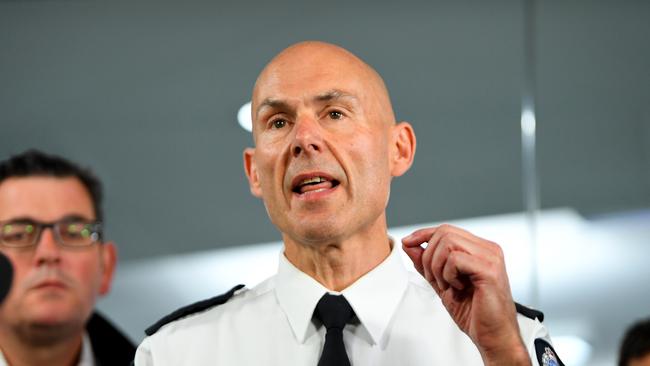Andrew Crisp’s evidence at pandemic management inquiry muddied already murky waters
The evidence given by the state’s Emergency Management Commissioner should have shed light on what happened in the botched hotel quarantine program, but it only led to more questions.

HS Coronavirus News
Don't miss out on the headlines from HS Coronavirus News. Followed categories will be added to My News.
Emergency Management Commissioner Andrew Crisp’s evidence before the parliament’s pandemic response inquiry should have led to answers over the bungled hotel quarantine inquiry.
Instead it just muddied the waters.
Mr Crisp chaired the pivotal March 27 meeting at which the parliamentary inquiry has already been told the decision was made to use private security contractors to run the scheme.
But his evidence contradicted key testimony given by Department of Jobs, Precincts and Regions secretary Simon Phemister who said he was tasked with locking down contractors after that meeting.
According to Mr Crisp work to secure contractors was already underway.
In June Mr Crisp signed off on an urgent request to call in 850 ADF personnel to help run the program in what appeared to be an acknowledgment the scheme was failing.
Less than 24 hours after that request was made, it was cancelled.
Asked by the Public Accounts and Estimates Committee to explain the about face, Mr Crisp had no specific answer but to say other options were being explored.
Earlier this month Mr Crisp issued a statement denying any offer of ADF support to run the quarantine program.
It contradicted claims by Prime Minister Scott Morrison and defence minister Linda Reynolds.
Pressed on how that statement came to be Mr Crisp conceded it was issued after consultation with the Department of justice, confirmation of the politics at play in the midst of a pandemic.
In almost two hours of intense questioning Mr Crisp became increasingly evasive in his responses, and repeatedly hesitated when asked to hand over planning documents to the inquiry.
Emergency Management Victoria was set up to unite all emergency agencies and act as the overarching body in a crisis.
Under its structure the commissioner has responsibility for co-ordination before, during and after major emergencies, including the management of consequences of an emergency.
It emerged following a shake-up of the state’s emergency management system following the Black Saturday bushfire disaster in which 173 people died.
More than double that have now died as a result of the COVID-19 pandemic.
But the multi-agency response has revealed an emergency management structure in disarray.
Victorians deserve to know how key decisions were made, on whose orders, and why.
MORE NEWS
CRIMINAL PROBE INTO HOTEL QUARANTINE SECURITY COMPANIES
BUREAUCRAT THAT BOASTED ABOUT HOTEL QUARANTINE TO FRONT INQUIRY
STATE OF EMERGENCY MAY BE EXTENDED UNDER COMPROMISE DEAL
